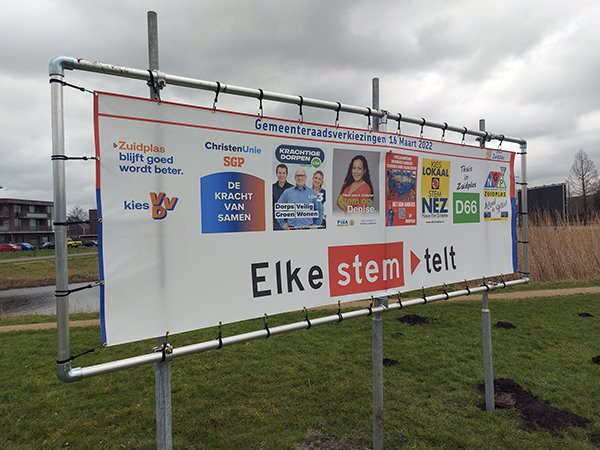On 16 March of this year, people in the Netherlands went to the polls to vote, this time to elect local councillors in 332 of the 345 municipalities throughout the country. Elections at the municipal level are held every four years and decide who will sit on the municipalities councils that determine local issues. What’s interesting about these local elections that is as long as a person is registered with the local ‘gemeente’ and over the age of 18, they can vote – including EU citizens from other countries and expats! Still, this didn’t help the 2022 voter turn-out, as this election saw the fewest people voting in history, with only 50.3% of people actually voting.
The administrative levels of government in the Netherlands start with national at the top, then the provincial level, then the municipality. One municipality (‘gemeente’) might cover several smaller towns or just one larger city, and is generally where you register your stay and arrange driver’s licenses. The gemeente is also in charge of many local issues, from waste collection and roadworks to social care and schools. While council members are elected by popular vote, mayors are actually appointed by the national government.
The candidates for the municipal councils and positions can come from either national or local political parties. The 2018 elections already saw a strong upswing in local political parties, but nothing compared to the 2022 elections. The largest national party, the VVD (the party of the current prime minister), became the largest party in the local elections as well, and the Labour Party (PvdA) took over from the Green Left (GroenLinks) party as the leader in the capital of Amsterdam. The second largest coalition national party, D66, won big in Gouda, Amersfoort and Den Bosch, but the remaining two coalition parties, CDA and CU, lost many seats. Other disappointments included the right-wing parties, the PVV and FvD, which both gained lower results than what they had expected. Still, the winners of the election were definitely the local political parties, which claimed 36% of the votes.
What I found interesting – besides the low voter turnout – was the general discussion after the elections. Dutch talk shows spent several evenings discussing what could be the reason the local parties did so well and why the national parties continued to lose seats in municipal councils. To me this is an odd thing to discuss, since it seems obvious that a local party would do well in a local election. To be honest, I’m surprised more seats didn’t go to the local parties, since obviously they have local interests, issues and solutions at the core of their political platforms. For me it seems odd to think that a national party would have the same level of vested interest in local issues that a local party would. Many speakers in the evening talk shows said that if the turnout had been greater, the national parties would likely have won more seats. I’m not sure that this is true. It seems that the growth in number of council seats gained by local parties is an indication of the voters’ general opinion on local politics.
The discussions also focused on what the national parties could do to gain more foothold in the local elections. Now, I’m not political scientist and certainly not for Dutch politics, but at face value it seems the best chance for national parties to regain seats on the local (or even provincial) level is to align themselves with local parties. That would also give the novice or less-informed voter an idea of where the local party stands on various political issues – something I found difficult to find out for local parties. National European political parties are all aligned with European parties in the EU – the Netherlands included. Why not extend this association in the other direction to the local level? Perhaps there are loose associations already, but again these are not easy to find online or in local media.
Where local parties stand in relation to the national parties aside, the national government above all recognizes the problem of low voter turnout. The Dutch Minister for Internal Affairs, Hanke Bruis Slot, has initiated an investigation as to the reasons behind the low numbers.
Written by Marla Thomson
